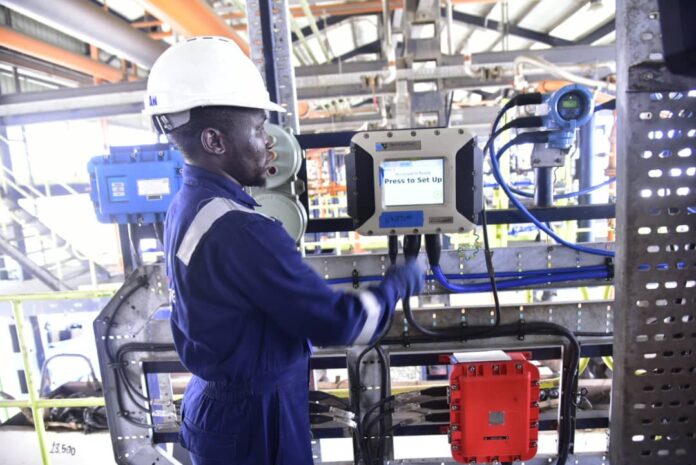The Dangote Refinery has finally addressed claims by some Nigerian fuel marketers that its premium motor spirit (PMS), commonly known as petrol, is more expensive than imported fuel.
The Independent Petroleum Marketers Association of Nigeria (IPMAN) had sparked debate after suggesting that the cost of fuel from the Dangote Refinery is higher than that of imported alternatives.
IPMAN’s national assistant secretary, Yakubu Suleiman, made the statement during a weekend television interview, stating that “If Dangote has a product selling for N1,000, let’s assume, and there’s another place selling for N900, we can’t just say, for the sake of our relationship with Dangote, that we’ll instruct our members to buy there. We must go where the price is lower, where we’ll get profit.”
This statement triggered a response from Dangote Refinery, which expressed concern over what it described as misinformation.
In a statement issued by Anthony Chiejina, the Group Chief Branding and Communications Officer, Dangote Refinery defended its pricing strategy, stating that it was aligned with international standards.
“We benchmark our prices against international rates and believe that our pricing is competitive when compared to the cost of imports,” Chiejina explained.
According to Dangote, the accusation that its fuel is more expensive is misleading and fails to take into account the quality difference between its fuel and imported alternatives.
Chiejina stressed that if imported fuel appears to be cheaper, it is because it may be of substandard quality.
“If anyone claims they can land PMS at a price cheaper than what we are selling, then they are importing substandard products,” he argued. “These traders are dumping low-quality fuel into Nigeria, disregarding both the health of Nigerians and the long-term functionality of their vehicles.”
Dangote also criticized the regulatory landscape, pointing out that the Nigerian Midstream and Downstream Petroleum Regulatory Authority (NMDPRA) does not have sufficient laboratory facilities to test the quality of imported fuel.
This lack of testing capability, he warned, makes it easier for low-grade fuel to enter the Nigerian market unchecked.
“Unfortunately, the regulator (NMDPRA) does not even have laboratory facilities to detect substandard products when imported into the country,” the statement read.
Dangote Refinery highlighted its own commitment to offering high-quality fuel at fair prices, explaining that it had set its rates below the prices established by the Nigerian National Petroleum Company Limited (NNPCL).
According to the refinery, NNPCL had initially set the price for domestic marketers at N971 per litre for ship-based sales and N990 per litre for truck-based sales.
“In a show of goodwill and in the interest of Nigeria, we lowered our prices to N960 per litre for ship-based sales while maintaining N990 per litre for truck-based sales,” the refinery stated.
However, Dangote claims that this move was not enough to stop certain international traders from using cheaper tactics to compete.
In an unexpected revelation, Dangote stated that an international trading company recently leased a depot facility next to the Dangote Refinery with the alleged intent of blending lower-quality products to flood the Nigerian market.
“This is detrimental to the growth of domestic refining in Nigeria,” the statement continued. “Such actions undermine our goal to provide affordable, high-quality fuel for Nigerians.”
Dangote warned that this trend could negatively impact Nigeria’s economy and job market if left unchecked.
In its statement, Dangote called for greater protection for the Nigerian refining industry, referencing measures taken in the U.S. and Europe to safeguard domestic industries.
“Many countries impose high tariffs on imports like electric vehicles and microchips to protect their industries,” Chiejina noted, underscoring the need for Nigeria to do the same.
The refinery reiterated its commitment to producing high-quality fuel that Nigerians can trust.
“We are determined to provide good quality, domestically refined petroleum products at affordable prices,” Dangote stated.
The refinery urged Nigerians to be wary of misinformation and disregard any claims that encourage the continued importation of low-quality products into the country.
“We call on the public to disregard the deliberate disinformation being circulated by those who prefer to export jobs and import poverty,” Chiejina concluded.
The tension between Dangote Refinery and IPMAN reflects the ongoing challenges in Nigeria’s oil industry, as the nation attempts to balance its need for affordable fuel with concerns over product quality and economic self-reliance.
Many industry watchers argue that Dangote’s call for a more regulated import market may be necessary for Nigeria to achieve long-term stability in its fuel supply.
They say that only by producing fuel locally and maintaining strict quality standards can Nigeria reduce its reliance on imports, boost job creation, and foster a sustainable economy.

